A user menu provides a list of folders that contain accessible screens. Each group needs an associated user menu. A group can have only one associated user menu, however, the same user menu can be associated to multiple groups. Note that a user can belong to multiple groups which may provide them access to multiple user menus.
The user menus initially available in Workforce are:
•Admin Menu. This menu includes all available features and screens and will be used to set up the Workforce system for your company.
•Workforce Manager . This menu includes features and screens applicable to most managers.
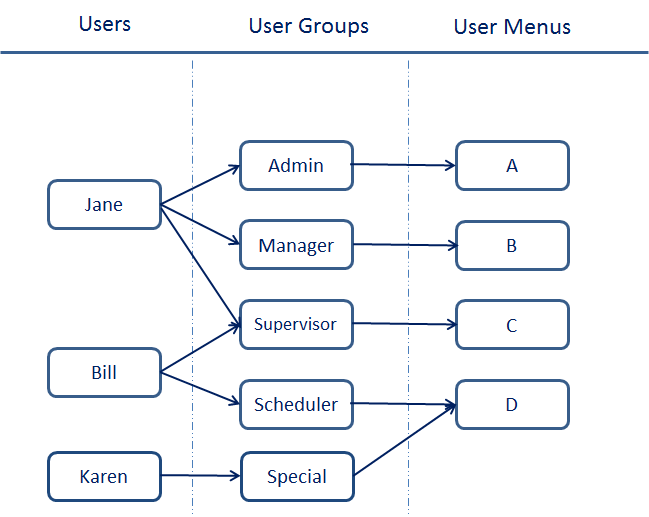
In this example, Jane will have access to menu A, menu B and menu C, Bill will have access to menu C and menu D and Karen will have access to menu D only.
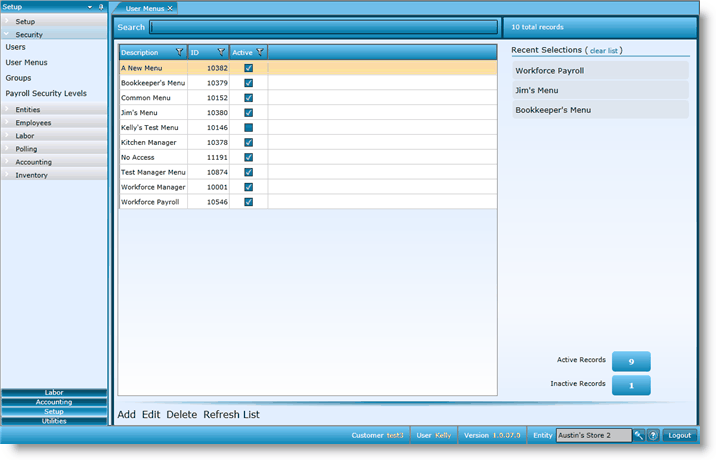
The menu grid has three columns:
oDescription - When a menu is created, it should be titled with a description so it can be identified.
oID - The ID is a unique identifier and is automatically assigned by the system. Although you can search by it, you are not provided the option to choose or change it.
oActive - Active menus have a check in the box and inactive menus are blank. Active user menus are available to be assigned to groups. Inactive menus cannot be assigned.
The right column shows a list of the most recently viewed or edited user menus.
The bottom of the right column shows a tally of all Active Records and Inactive Records.
1.Click on the Add link.
2.If you would like to copy an existing menu to edit, choose it from the drop-down. To start a new menu, choose Empty Menu.
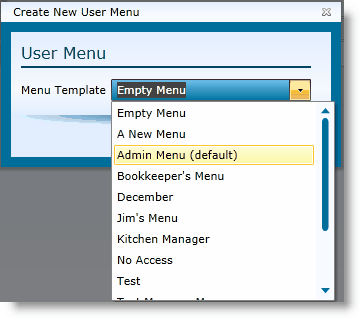
3.Add a title in the Description field.

4.If the user menu should be active, make sure the Active box is checked.
5.Click on Add Menu ![]() . Note that a folder is added to the left column titled, New Menu
. Note that a folder is added to the left column titled, New Menu ![]() .
.
6.Click on the New Menu folder. Note, it will turn gray ![]() .
.
7.Next, click on Rename Item ![]() .
.
8.Rename this first new menu with the same title provided in the Description field. To do so, click in the field and either delete the current text or highlight the entire title and type over it.
9.Click the Save button.
10. Next, click on the new menu title and then click on the Add Menu button. Note that a circle with an arrow now appears next to the original folder. When you click on the arrow, the folder will expand to show the new folder you just added.

11. Rename the New Menu folder with a category name. Add as many categories as you need using the same method.
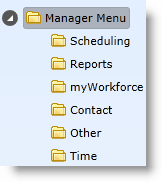
12. Next, click and drag the features/screens you want to each category folder. Make sure to release the feature while your mouse pointer is on the folder.
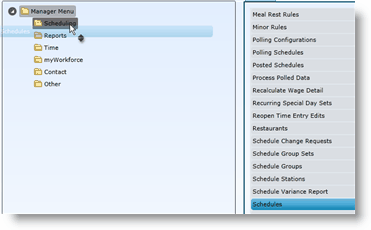
You will notice that the sub-folder, Scheduling, now has a circle with an arrow in it to the left of it. This indicates that the folder has folders and/or features inside of it. Also note that the feature within the folder is indented. When the folder is collapsed, the arrow points directly at the folder name. When the folder is expanded, the arrow points down and to the right.
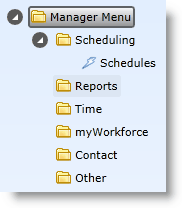
You can move folders and features by clicking and dragging them up or down in the menu to position them. Keep in mind that if you want to nest items (where it is inside of another like Schedules is under Scheduling above), make sure that the item you want to nest is indented under the folder it should be in. The best way to make sure an item is nested properly is to release it directly on the folder it should be in.
13. Click the Save button.
14. To make a user menu usable, make sure to apply it to a group.
All available features are listed in the right column under the Features tab. Each feature corresponds to a screen available in Workforce. To make a new user menu, decide which features should be included.
Feature |
Description |
Workforce users can add, edit or delete accounting entities. |
|
If you export payroll data to ADP, this screen allows you to set up the parameters. |
|
A report that shows all employees who are approaching overtime. |
|
A log that shows who has made changes, additions or approvals or denials. |
|
A report that shows employee birthdays by month. |
|
Workforce users can add, edit or delete rules for breaks. |
|
A report that lists employees and their contact information. |
|
Allows Workforce users to change the color scheme of their Workforce. |
|
Workforce users can change their menu. This feature is only applicable if the Workforce users is in multiple groups. If the user is in only one group, they will only have one menu available. |
|
Allows users to access and edit the chart of accounts. |
|
A report that shows a list of GL Accounts, their Description, Account Type, Standard Balance, Statement Type and Statement Category. |
|
Workforce users can close time entry edits by period. |
|
Workforce users can add, edit or delete commissary departments. |
|
Workforce users can add, edit or delete commissary entities. |
|
Workforce users can add, edit or delete consecutive day overtime rules. |
|
Workforce users can add, edit or delete Cash Tips, Cash Sales and/or Credit Sales for any day. |
|
Workforce users can add, edit or delete daily overtime rules. |
|
Workforce users can add, edit or delete day part definitions. |
|
Workforce users can add, edit or delete the default labor definitions. |
|
Workforce users can delete time entries between two specified dates. |
|
Workforce users can add, edit or delete departments. |
|
A report that shows all time records that have been edited. |
|
Workforce users can add, edit or delete EEOC definitions. |
|
Workforce users can add, edit or delete employee classes. |
|
Workforce users can add, edit or delete employee time adjustment reasons. |
|
Workforce users can add, edit or delete employee time off reasons. |
|
Workforce users can add, edit or delete employees and their associated information, entities and departments. |
|
Workforce users can add, edit or delete employees for the current entity and their associated information, entities and departments. |
|
Workforce users can set up SMTP Configuration for the outgoing mail server, indicate which schedule summary bands should be included on schedules and indicate if a default schema should be used to generate MyWorkforce user IDs. |
|
Workforce users can set up filters of entities for reporting purposes. |
|
Workforce users can add, edit or delete event types. |
|
Workforce users can add, edit or delete events. |
|
If ADP processes your payroll, this screen will allow you to export your payroll data to them. |
|
Workforce users can export payroll data to a third party payroll processor. |
|
If you employ the third party, Paychex, to process your payroll, this screen will allow you to export your payroll data to them. |
|
Workforce users can setup sets of GL Accounts to view only certain accounts. |
|
Workforce users can setup security groups. |
|
Workforce users can view or edit time punches that have been exported. |
|
Workforce users can view and advertise any house shifts. |
|
Workforce users can include POS codes to ignore when evaluating polling exceptions. |
|
Workforce users can add, edit or delete available jobs. |
|
Workforce users can add, edit or delete labor definitions. |
|
A report that shows polling exceptions. |
|
Workforce users can access a report that shows the variance between labor scheduled and actual data. |
|
Where licenses are applied for all Compeat products. |
|
Workforce users can access the logbook. |
|
Workforce users can define or edit the parameters for the logbook. |
|
A list of shifts for the day. |
|
Workforce users can add, edit or delete rules for meal rests. |
|
Workforce users can add, edit or delete rules pertaining to minors. |
|
A log of all notifications that have been attempted to be sent to employees. |
|
If you export payroll data to Paychex, this screen allows you to set up the parameters. |
|
Workforce users can add, edit or delete security levels. |
|
Workforce users can add, edit or delete polling configurations. |
|
Workforce users can add, edit or delete the polling schedule. |
|
Workforce users can add, edit or delete posted schedules. |
|
Workforce users can manually process any recently polled data. |
|
Workforce users can recalculate the actual wages and/or scheduled costs for a specific time period. |
|
Workforce users can define recurring special days. These are special days that occur on the same date every year. |
|
Workforce users can reopen time entries after they have been closed. |
|
Workforce users can reset MyWorkforce credentials for employees without having to access their employee data. |
|
Workforce users can add, edit and delete restaurant station sets. |
|
Workforce users can add, edit and delete restaurant stations. |
|
Workforce users can add, edit or delete restaurants. |
|
Workforce users can view all schedule change requests made by employees. |
|
Workforce users who export schedules to their POS can view this report to see if any exceptions exist. |
|
Workforce users can add, edit or delete sets of schedule groups. |
|
Workforce users can add, edit or delete schedule groups. |
|
A report that shows the Scheduled Labor, Actual Labor and the difference of the two. |
|
Workforce users can view, add, edit or delete schedules that have not been posted. If the Workforce users is also in a user group with the security setting to allow the posting of schedules they can also post them. Additionally, if their user group security setting allows, they may also be able to edit the sales forecasts. |
|
Workforce users can send an employee or group of employees messages. |
|
Workforce users can edit the SMS configuration. |
|
Workforce users can edit the SMTP configuration. |
|
Workforce users can define days where sales are expected to be either larger or smaller than other days. Typically this is centered around holidays or special events. |
|
Workforce users can add, edit and delete split shift rules. |
|
Workforce users can add, edit and delete spread of hours rules. |
|
A report that breaks down how many employees are staffed at any time during the day. |
|
Workforce users can add, edit and delete statement categories. |
|
Workforce users can define the categories to be included under store group 1. |
|
Workforce users can define the categories to be included under store group 2. |
|
Workforce users can add, edit or delete time punches for employees. |
|
Workforce users can view data for employees who have requested time off. |
|
A report that shows Regular Hours, Overtime Hours and other information related to shifts worked. |
|
Workforce users can view all employees' unavailability. |
|
Shows who is currently logged in. |
|
Workforce users can add, edit or delete user menus. |
|
Workforce users can add, edit or delete other workforce users. |
|
Workforce users can add, edit or delete variable special days. These are days that occur on a different date each year. |
|
Workforce users can add, edit or delete wage groups. |
|
Workforce users can add, edit or delete wage rule sets including overtime rules, rest rules and minor rules. |
|
Workforce users can add, edit or delete wage types. |
|
Workforce users can add, edit or delete weekly hour rules. |
|
Workforce users can add, edit or delete overtime rules that are applied to a labor week. |
|
A report that can be run to view a specific schedule which can be filtered by department or day part. The report can be printed or downloaded to various file types. |
1.Double click on the Description or ID or
2.Highlight the user menu and click on the Edit link at the bottom.
3.Make edits.
4.Click the Save button.
Send feedback on this topic.